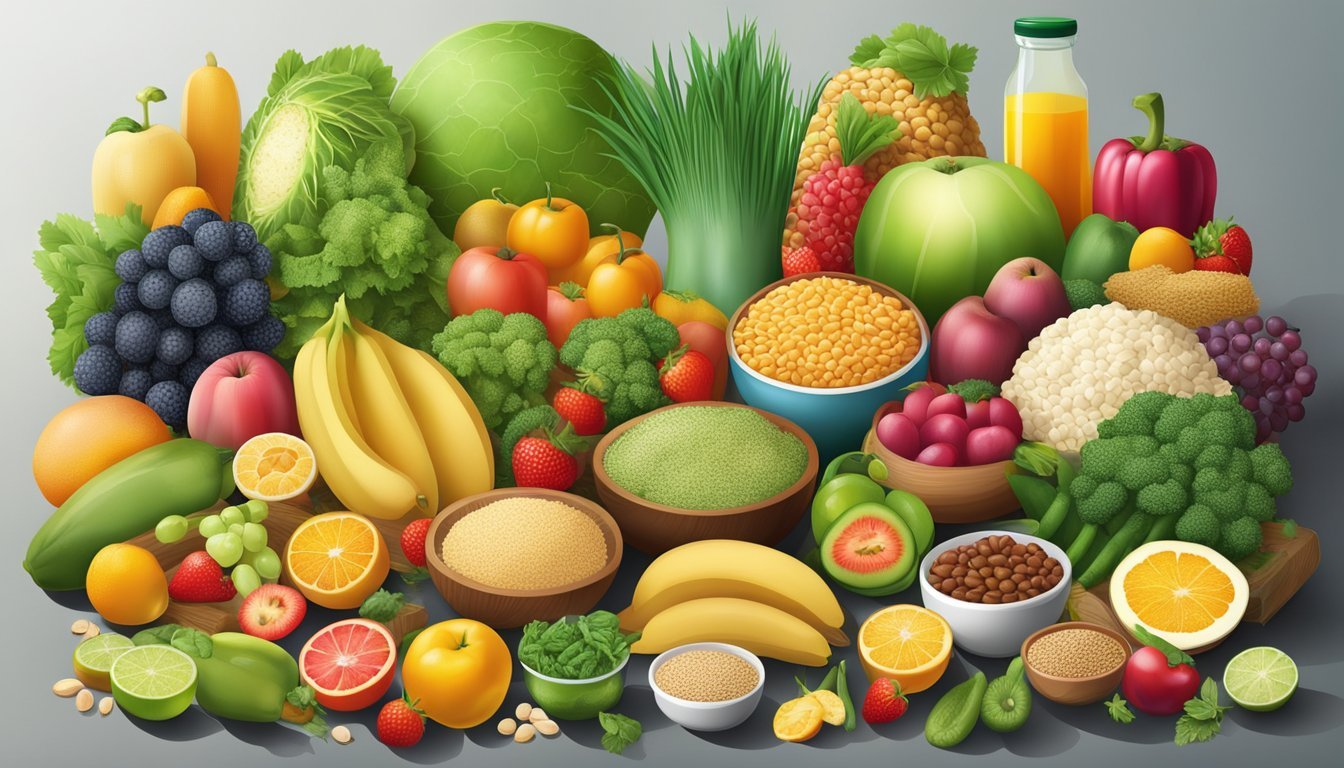Natural Foods for Breast Health: Separating Fact from Fiction
For those curious about natural ways to enhance breast size, certain foods are often suggested as potential aids. These foods may contain phytoestrogens or other compounds believed to influence breast tissue growth. While scientific research on the effectiveness of these foods may be limited, many individuals explore these options as part of a holistic approach to wellness.
Incorporating specific dietary choices into one's routine can potentially support overall body health and may have a mild impact on physical development. It is essential to understand the balance between diet, lifestyle, and genetics when considering natural methods for body enhancement.
1) Salmon
Salmon is a nutritious fish that offers numerous health benefits. It is rich in essential nutrients such as omega-3 fatty acids, vitamin B6, vitamin D, and selenium. These nutrients are crucial for maintaining overall health and well-being.
Omega-3 fatty acids in salmon contribute to hormonal balance, including estrogen, which plays a role in breast tissue development. Regular consumption of omega-3 fatty acids supports this balance.
Vitamin B6 in salmon aids in hormone regulation. It contributes to the synthesis of neurotransmitters and hormones, impacting various body functions.
Vitamin D in salmon supports the absorption of calcium, essential for healthy bones and potentially influencing hormonal activities linked to breast development. Including salmon in the diet provides a natural source of these important nutrients, promoting overall body health.
2) Eggs
Eggs are a nutritious food that can be included in a balanced diet.
Rich in protein, eggs provide essential amino acids that can support overall tissue health. They also contain healthy fats, which are important for hormone production.
Vitamins and minerals in eggs, including vitamin D and B-complex vitamins, contribute to various bodily functions that may play a role in maintaining health.
Including eggs as part of a varied diet can offer nutritional benefits.
3) Chickpeas
Chickpeas are a significant source of phytoestrogen, a plant compound known to mimic estrogen in the body. This quality makes them an interesting option for those looking to naturally support estrogen levels.
Phytoestrogen in chickpeas may assist in promoting breast tissue health and growth.
Including chickpeas in one's diet can be simple. They can be added to salads, stews, or blended into a popular spread like hummus.
Besides phytoestrogen, chickpeas are rich in protein, fiber, and essential vitamins and minerals, contributing to an overall balanced diet.
Regular consumption of chickpeas, along with other nutrient-dense foods, can be part of a natural approach to supporting hormone balance.
4) Spinach
Spinach is a nutrient-dense leafy green that may play a role in natural breast enhancement. Packed with essential vitamins and minerals, spinach is an excellent source of fiber, vitamins C and K, magnesium, and folate.
The nutrients in spinach can promote overall health, which is crucial when attempting to modulate hormone levels. Estrogen, a hormone involved in breast tissue development, can be positively influenced by a well-balanced diet rich in green leafy vegetables.
Research suggests that dark leafy greens such as spinach contain phytoestrogens, which are plant-derived compounds similar to estrogen. These phytoestrogens may contribute to breast tissue growth when included regularly in the diet. Spinach's high levels of antioxidants also support overall cellular health.
Eating spinach can also help remove excess estrogen from the body due to its fiber content. This balance is vital because excessive estrogen can lead to various health issues.
Incorporating spinach into daily meals is easy, whether in salads, smoothies, or sautéed dishes. Its versatility and rich nutrient profile make it a valuable addition to any diet aimed at enhancing breast size naturally.
5) Pumpkin Seeds
Pumpkin seeds, also known as pepitas, are rich in essential nutrients and beneficial compounds. They contain a wealth of vitamins and minerals including iron, zinc, magnesium, and a notable amount of antioxidants. These nutrients can contribute to overall health.
In terms of their potential to promote breast growth, the seeds contain phytoestrogens. Phytoestrogens are plant compounds that mimic the function of estrogen, a hormone that plays a key role in breast development. Including pumpkin seeds in one's diet might help to naturally boost estrogen levels.
Additionally, pumpkin seeds are high in healthy fats and proteins which are important for maintaining balanced hormone levels. Hormone balance is crucial for various bodily functions, including the development of breast tissue.
A typical serving size is about 1 oz (28 grams), providing approximately 160 calories. This makes them a nutrient-dense snack that can be easily added to your daily diet. They can be eaten on their own or sprinkled over dishes like salads and yogurt.
Incorporating pumpkin seeds into meals is a simple way to enjoy their potential benefits. Regular consumption might support hormone health, contributing positively to breast growth and overall wellness.
6) Greek Yogurt
Greek yogurt is a nutrient-dense food that offers several potential benefits for overall health. Rich in protein and good fats, it provides essential nutrients that can support the body's natural functions.
One of the key components of Greek yogurt is its high protein content. Protein plays a crucial role in building and maintaining body tissues, including the growth and support of muscle mass.
Greek yogurt is also rich in calcium, a mineral vital for bone health. Adequate calcium intake can help in maintaining strong bones and potentially support the structural development of various body parts, including breast tissue.
Additionally, Greek yogurt contains other important nutrients like phosphorus, magnesium, and vitamin D. These nutrients aid in the absorption and utilization of calcium, contributing to overall bone and tissue health.
Incorporating Greek yogurt into a balanced diet can be a nutritious way to provide the body with the necessary building blocks for various bodily functions. It is a versatile food that can be easily added to meals or enjoyed as a snack.
7) Blueberries
Blueberries are recognized for their numerous health benefits. They are rich in essential nutrients, vitamins, and antioxidants. These small berries are known to promote overall health and wellbeing.
Studies suggest that blueberries can contribute positively to breast health. Their high antioxidant content helps combat free radicals, which can damage cells. Regular consumption may reduce the risk of breast cancer.
The beneficial compounds in blueberries, such as anthocyanins, have shown promise in reducing tumor growth in animal models. These compounds can inhibit the proliferation of cancer cells and promote their destruction.
Incorporating a serving of blueberries into your daily diet is simple. Fresh berries can be added to breakfast cereals, smoothies, or eaten as a snack. Blueberries not only enhance taste but also offer protective health benefits.
8) Almonds
Almonds are rich in essential nutrients that benefit overall health, including healthy fats, protein, and vitamins. They contain phytoestrogens, which are plant compounds that can mimic the hormone estrogen in the body.
Incorporating almonds into the diet may support breast tissue health due to their nutrient composition. Regular consumption of almonds can help maintain hormonal balance, potentially influencing breast development.
Along with phytoestrogens, almonds offer a good amount of vitamin E. This vitamin is known for its antioxidant properties, which protect cells from damage and promote healthy skin and tissue.
Almonds are versatile and can be added to various dishes or enjoyed as a snack. They can be included in salads, oatmeal, or yogurt, making it easy to incorporate them into daily diets.
Including a handful of almonds regularly provides various health benefits and may contribute to breast health naturally.
9) Avocados
Avocados are a versatile and nutritious fruit. They are rich in healthy fats, vitamins, and minerals. These nutrients support overall body health, including the well-being of breast tissues.
The healthy fats in avocados can help maintain hormone levels. Balanced hormones are crucial for breast growth and development. Consuming avocados can be beneficial as part of a balanced diet.
Additionally, avocados contain vitamin E. Vitamin E is vital for skin health and elasticity. It may support the firmness and appearance of breast skin.
Moreover, avocados are high in antioxidants. Antioxidants protect the body from harmful free radicals. This promotes cellular health, which is important for breast tissue.
Incorporating avocados into meals is simple. Add them to salads, sandwiches, or smoothies. Their creamy texture and mild flavor make them a popular choice.
Eating avocados regularly can be part of a healthy lifestyle. Prioritize a varied diet and balance avocados with other nutrient-rich foods.
10) Sweet Potatoes
Sweet potatoes are a nutritious food that may support breast health.
These root vegetables are rich in beta-carotene, a precursor of vitamin A. Vitamin A contributes to the maintenance of healthy tissues, including breast tissue.
Sweet potatoes also have antioxidant and anti-inflammatory properties, which can be beneficial for overall cellular health. Antioxidants help to neutralize harmful free radicals in the body, protecting cells from damage.
In addition to beta-carotene, sweet potatoes provide dietary fiber. Fiber aids in digestion and helps maintain a healthy hormonal balance, which is important for breast tissue development.
Incorporating sweet potatoes into a balanced diet can offer essential nutrients while promoting overall well-being.
Enjoy sweet potatoes in various forms, such as baked, mashed, or roasted, to take advantage of their health benefits.
Nutritional Building Blocks For Breast Development
Supporting breast development through nutrition involves incorporating key nutrients and maintaining a balanced diet rich in specific foods. This approach focuses on promoting natural processes and overall health without relying on extreme measures.
Essential Nutrients
Certain nutrients play a crucial role in breast development. Estrogen production is essential for this process, and foods that boost estrogen are beneficial. Fruits like cherries, bananas, and pomegranates help stimulate estrogen production while reducing testosterone levels.
Healthy fats such as those found in avocados, nuts, and seeds are important. They aid in hormone balance and help maintain the overall health of breast tissue. Additionally, protein-rich foods such as lean meats, fish, and legumes support tissue growth and repair.
Vitamins and minerals like Vitamin C, Vitamin E, and B-vitamins are important. These help in collagen production and overall cell health. Green leafy vegetables are rich in these nutrients.
Balanced Diet Tips
A balanced diet should incorporate a variety of whole foods. Fruits and vegetables should be consumed daily to ensure sufficient intake of essential vitamins and minerals. Lean proteins support muscle and tissue growth, while healthy fats assist in hormone regulation.
Staying hydrated is vital, so drink plenty of water and consider natural fruit juices and herbal teas. Avoid processed foods, excessive sugar, and unhealthy fats as these can negatively impact hormone balance.
Creating a diet plan that includes a mix of these food groups can naturally support breast development and contribute to overall well-being.
Hormonal Influence On Breast Growth
Hormones play a crucial role in breast development. Two key factors in this process are estrogen and phytoestrogens, which can influence breast growth in different ways.
The Role of Estrogen
Estrogen, a primary female sex hormone, directly impacts breast tissue development. It stimulates the growth of ducts in the breast tissue during puberty and menstrual cycles. Estrogen levels fluctuate naturally and can significantly increase during pregnancy, contributing to breast enlargement and preparation for lactation.
Certain foods can boost estrogen levels. These include flaxseeds, soy products, and some fruits such as cherries and pomegranates. These foods are rich in vitamins and minerals, benefiting overall health while providing natural support for breast growth.
Impact of Phytoestrogens
Phytoestrogens are plant-derived compounds that mimic the action of estrogen in the body. Found in foods like soybeans, flaxseeds, and certain fruits, they can contribute to breast tissue growth by binding to estrogen receptors. This binding can help promote slight breast enlargement.
Regular consumption of phytoestrogen-rich foods can support maintaining balanced hormone levels. While the impact of phytoestrogens is generally mild, they offer a natural way to encourage healthy breast development. Individuals interested in natural breast enlargement might consider incorporating these foods into their diet.
Lifestyle Factors Affecting Breast Development
Several lifestyle factors significantly influence breast development. Key aspects include regular exercise and effective stress management strategies.
Exercise and Physical Activity
Exercise plays a vital role in maintaining overall hormonal balance, which can impact breast development. Engaging in physical activities such as jogging, yoga, or strength training can lead to increased estrogen production, promoting breast growth.
Muscle development under the breast tissue can also contribute to a more prominent breast appearance. Strength training exercises, including chest presses and push-ups, directly target the pectoral muscles, enhancing the breast's shape and firmness.
However, excessive exercise without balanced nutrition may lead to reduced body fat, potentially decreasing breast size. It's essential to maintain a balanced regime combining moderate exercise and proper dietary intake.
Stress Management
Chronic stress can negatively affect hormonal levels, impacting breast development. High-stress levels often lead to increased cortisol production, which may interfere with the hormones responsible for breast growth.
Stress-reducing techniques such as meditation, deep breathing exercises, and sufficient sleep are crucial in managing stress. Establishing a regular routine that includes time for relaxation and hobbies can support hormonal balance.
Incorporating nutrient-rich foods that support overall health, like fruits, vegetables, and lean proteins, can also aid in combating stress. Maintaining a positive mental outlook is beneficial for hormonal health and, by extension, breast development.









